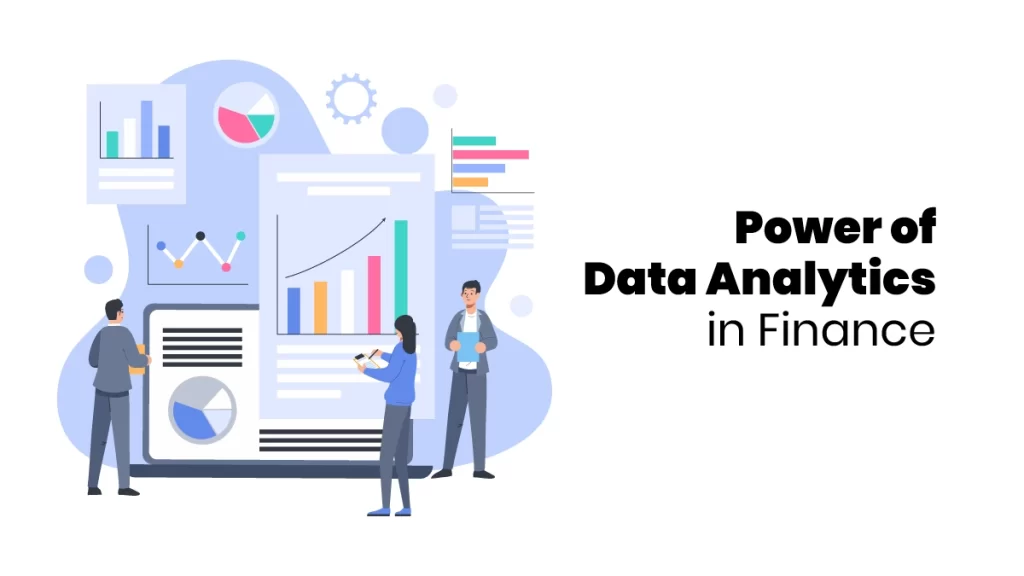In the rapidly changing terrain of today’s financial landscape, does data analytics in finance emerge as a transformative force, reshaping the operational dynamics and decision-making processes of organisations? Using extensive datasets and extracting meaningful wisdom has shown new possibilities for the finance industry.
Data analytics in finance has become essential in various realms, such as investment management, risk assessment, and customer engagement, fostering growth and addressing uncertainties. This makes us consider the following: To what extent does data analytics influence the future of finance, and can it authentically revolutionise our comprehension and navigation of the complex world of markets and money?
Defining Data Analytics
Systematically examining raw data, data analytics unveils meaningful insights, patterns, and trends. Using various techniques and tools, this method extracts valuable information from extensive and intricate datasets. The empowerment provided by data analytics enables organisations to make informed, data-driven decisions, identify opportunities, effectively manage risks, and optimise their operations.
The Impact of Data Analytics in Finance
The power of data analytics in finance empowers organisations to make more precise and efficient decisions. Below are key ways in which data analytics is reshaping the finance industry:
Risk Management
Understanding data analytics in finance is crucial for evaluating and managing risks. Financial institutions use this method to examine past data, spotting patterns and irregularities. By doing so, they can discover potential risks and create effective strategies to manage them. This approach helps reduce losses and helps choose decisions to protect assets.
Fraud Detection
In dealing with the common worry of financial fraud, data analytics helps spot fraudulent activities by carefully looking at patterns and irregularities in financial transactions. This way of being proactive doesn’t just stop fraud but also lessens the money lost, making the financial environment safer.
Customer Insights
Knowing what customers like and how they behave is necessary for banks and financial institutions to give personalised services and create effective marketing campaigns. Data analytics helps analyse customer information, giving organisations essential insights into customer groups, likes, and needs. This helps make customers happier and more committed to the services.
Investment Decisions
Data analytics in finance is like a foundation for intelligent investment choices. Financial experts can determine good investment chances and weigh the risks and returns by looking at market info, economic signs, and past trends. This way of using data boosts the accuracy of investment decisions, making portfolios perform better.

The Role of Finance Data Analysts
In this data-driven era, finance data analytics has become increasingly crucial. These professionals collect, analyse, and interpret financial data to deliver actionable insights to decision-makers. Armed with a strong understanding of finance principles, statistical analysis, and data visualisation techniques, finance data analysts play a multifaceted role, which includes:
Data Collection
Finance data analysts meticulously gather and organise financial data from diverse sources, including databases, financial reports, and market research.
Data Analysis
Leveraging statistical models and data analysis techniques, they pinpoint trends, patterns, and correlations within financial data. This process is instrumental in extracting valuable insights to make well-informed decisions.
Data Visualization
Finance data analysts use visualisation tools to craft visually appealing and understandable dashboards, charts, and graphs. This visual representation simplifies the comprehension of complex financial information for stakeholders.
Reporting and Recommendations
Beyond analysis, these professionals compile comprehensive reports summarising their findings and provide recommendations based on their insights. These reports are pivotal in assisting senior management in making strategic financial decisions.
The Scope of Data Analytics in Finance
The job of finance data analytics is vast and keeps getting bigger. Because technology is growing fast, there is a lot more financial data, and it’s getting more complicated. This means there’s a significant need for experts who can understand and analyse this data to help businesses grow and succeed.
Job Growth in Finance Data Analysis
Jobs for finance data analysts are growing a lot, and experts expect this growth to continue. Businesses increasingly rely on making decisions based on data, and financial data is becoming more complicated. This means there’s a significant need for people who analyse data.
The numbers show that jobs for financial analysts, which includes data analysts in finance, are expected to grow by 10% from 2020 to 2030. This is higher than the average for all jobs, which is good news for people interested in a career in finance data analysis.
Jobs are growing in traditional finance places and other industries like consulting, technology, and e-commerce. These industries are realising how vital data analytics is in finance. They’re actively seeking experts in this field, creating many job opportunities. This trend shows steady job growth and good career opportunities for finance data analysts.
Utilising finance training and engaging in conversations with industry professionals can aid in identifying the most suitable option for your career path. One notable institute offering a range of finance and accounting courses is Finprov. Our job-oriented courses include CBAT, PGBAT, Income tax, Practical accounting training, PGDIFA, DIA, GST, SAP FICO, Tally Prime, MS Excel, and more, complemented by placement assistance. For individuals seeking to improve their knowledge in the finance sector, Finprov presents a compelling choice. Pursuing finance certifications enhances your career growth and opens doors to new opportunities in the financial industry.










